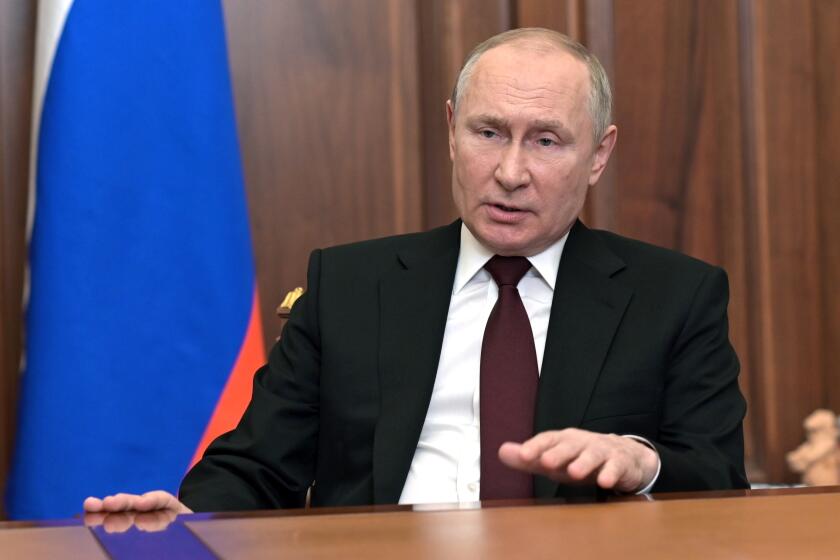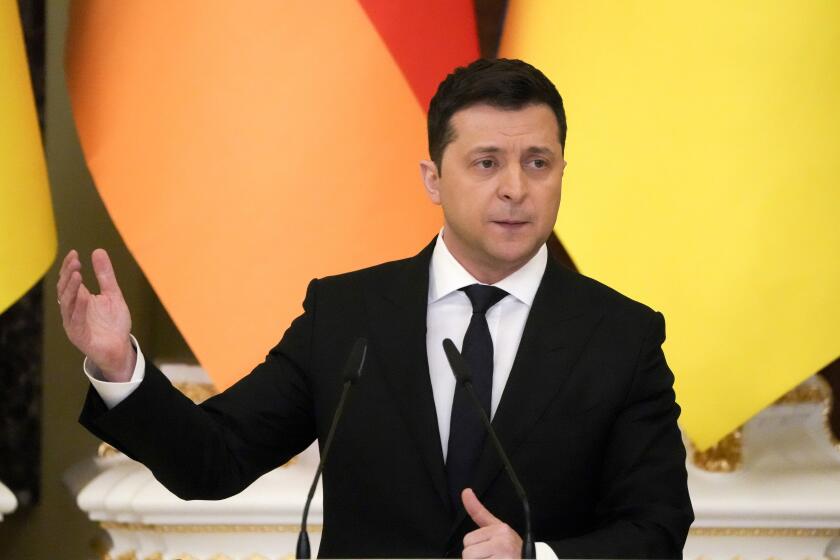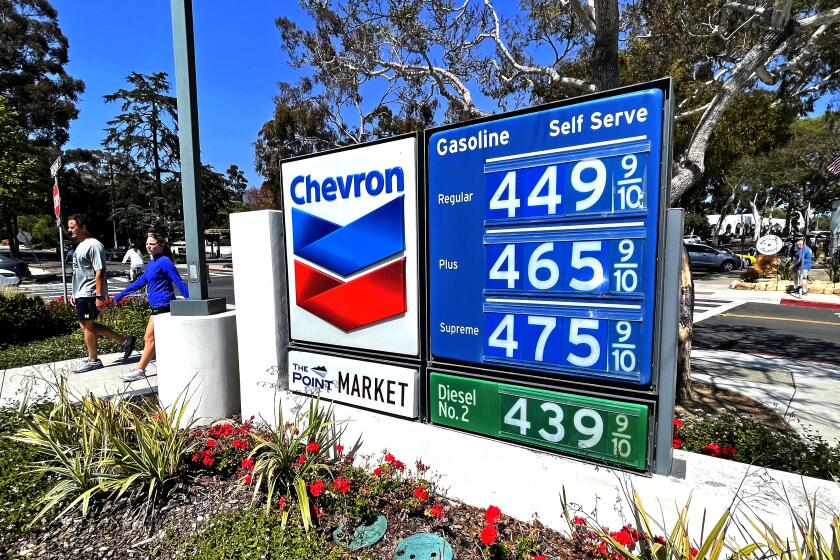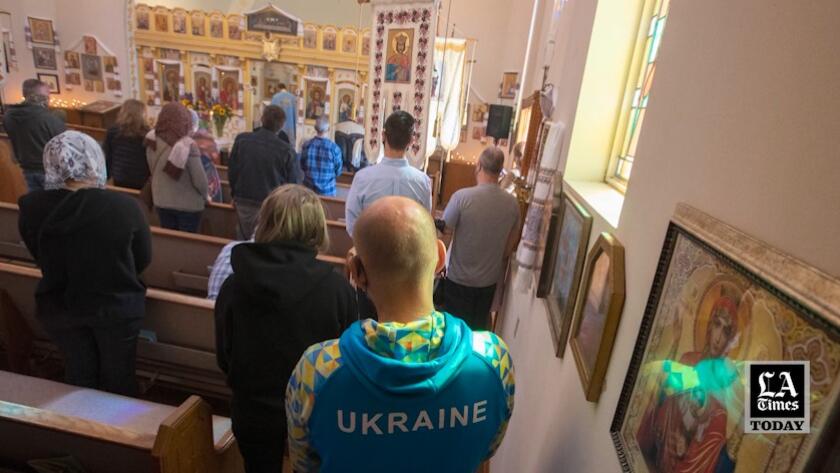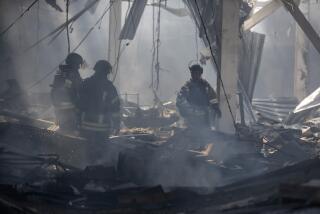‘A lot of innocent people will die’: Ukrainians in California decry Russia’s attack
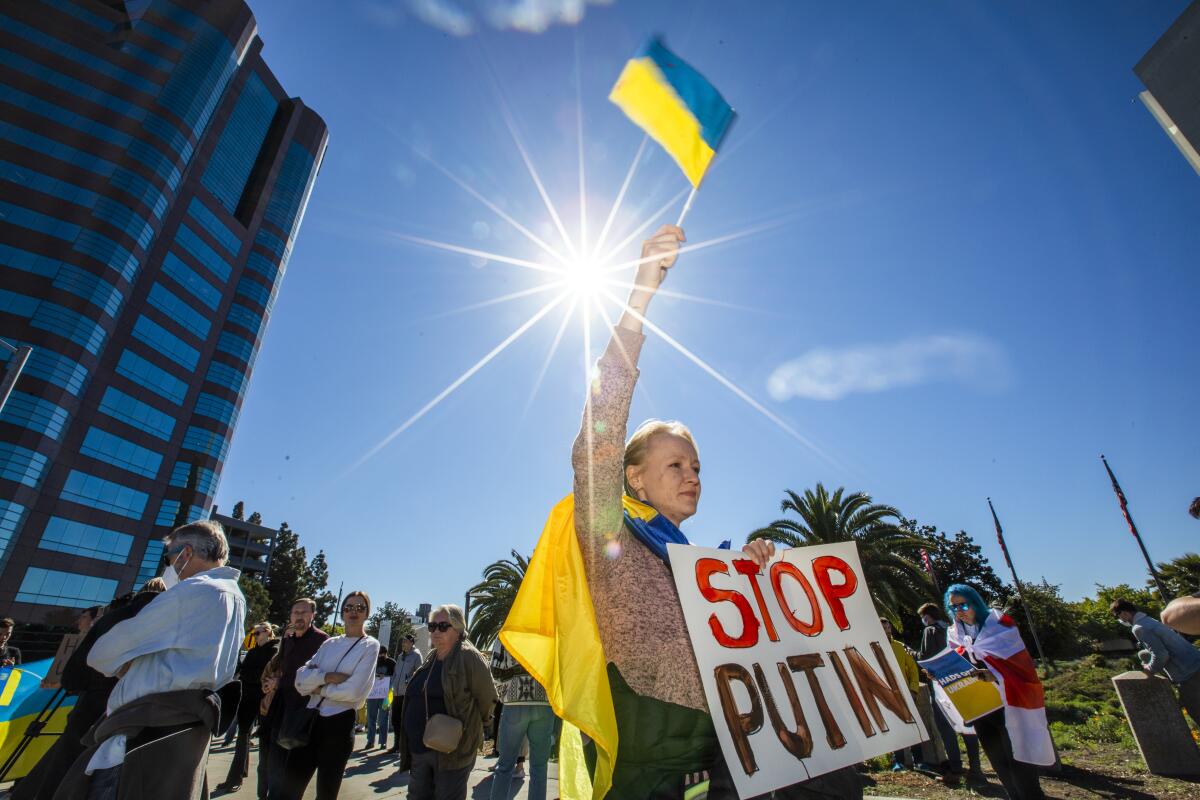
- Share via
The online meeting of the Ukrainian Culture Center in East Hollywood was filled with discussions of upcoming events — the annual celebration of a famed Ukrainian bard, planning a get-together to decorate traditional Easter eggs.
But the gathering quickly adjourned Wednesday night as the Russian military began firing rockets at Ukrainian cities and the inevitability of a Russian invasion became a reality.
“Putin has officially attacked,” one woman told the group.
Russian President Vladimir Putin needs the former Soviet republic Ukraine for his dream of returning superpower days.
As word spread that Russian President Vladimir Putin had ordered an incursion after weeks of failed diplomacy, California’s Ukrainian diaspora watched, stunned but not surprised. Many in the diaspora found themselves in a familiar position on Thursday morning, caught between two worlds: concerned by the outbreak of war intended to recast the map of Eastern Europe, fearing for loved ones nearly 6,000 miles away, and ready to spring into action to provide aid to the Ukrainian people.
“It’s no longer, ‘What’s the relationship between Ukraine and Russia?’” said George Wyhinny, vice president of the Ukrainian Culture Center, which is housed in a former theater that has hosted Ukrainian cultural events since 1961. “It’s, ‘What do you need? How do we get people here?’”
Community leaders across California said Thursday morning that they were regrouping in response to Russia’s attacks and gathering information from Ukrainian contacts, many of whom were sheltering in train and subway stations or fleeing west, to the countryside or to Poland. Although the Ukrainian diaspora in Southern California is small compared with communities on the East Coast and the Midwest, enclaves across the state keep close ties, community members say. The Golden State is home to roughly 112,000 people of Ukrainian descent, according to U.S. Census Bureau data, many of them clustered in the Bay Area, Los Angeles and Sacramento.
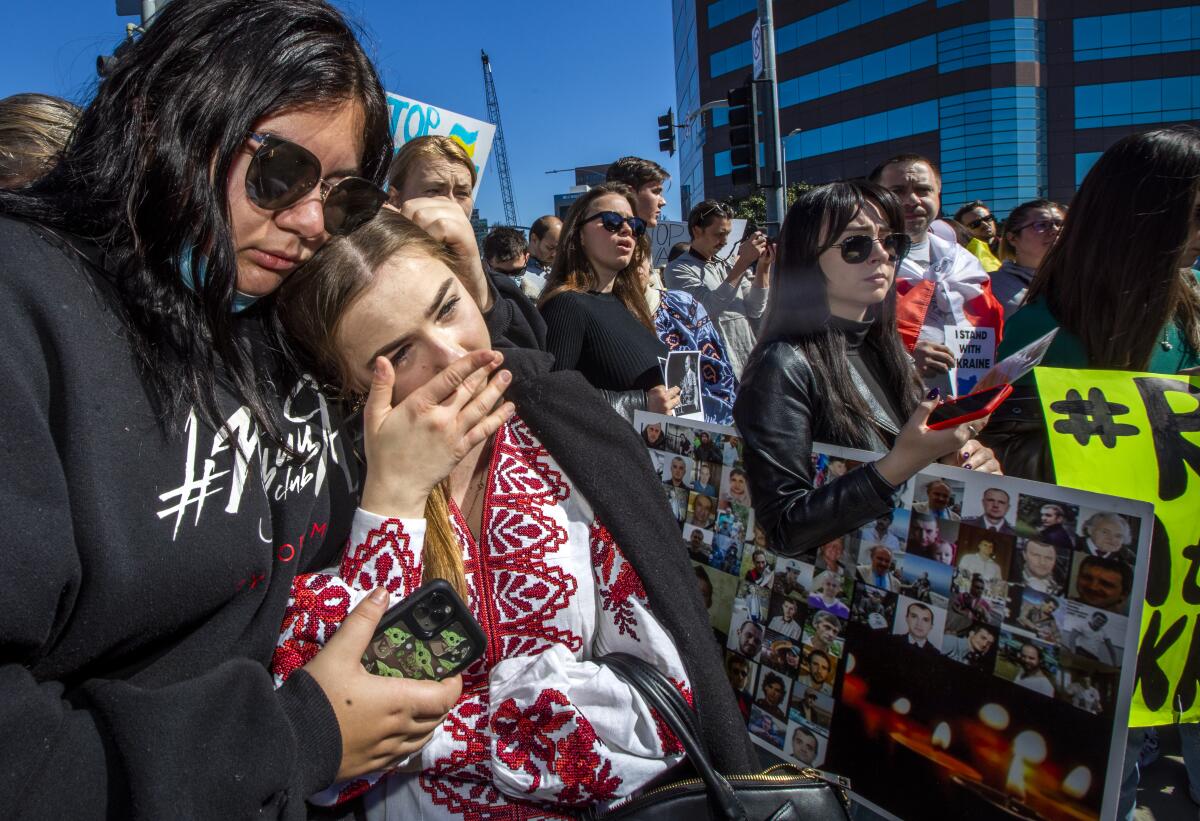
After the Wednesday night meeting broke up, Wyhinny said, he turned on the news and reflected on Ukraine’s decades-long fight for sovereignty and independence from its much larger and nuclear-armed neighbor.
“It was sinking in that this is actually happening,” said, Wyhinny, a Chicago native who works in the entertainment industry and uses the Ukrainian pronunciation of his first name, “Yurij.” “It’s all built on hatred and it’s very personal.”
Thursday morning, the center pondered its role, as Ukrainian Foreign Minister Dmytro Kuleba issued a call to the Ukrainian diaspora, vowing defiance and pleading for help. Should the center continue its normal operations as a cultural gathering point, its leaders wondered, or shift its focus toward becoming a political nexus where the community and members of other Baltic diasporas could meet and discuss how to best support the war effort?
As Russia moves ahead with its invasion of Ukraine, eyes are on Volodymyr Zelensky, who was elected in 2019 after finding fame as a comedian.
Laryssa Reifel, a first-generation Ukrainian American and president of the culture center, said that she was “not surprised in the least bit” by the attack.
“The thought that went through my head is, here we go again,” Reifel, 52, said. “The second thought is that everything our grandparents worked for in terms of the ultimate achievement of Ukrainian independence in the early ’90s has been swept away. The third thought is the world is going to have to decide whether or not they stand by and let this happen with a clear conscience.”
Ukrainian migration to the United States came in four major waves, scholars say: during the late 19th to early 20th centuries; amid the Ukrainian struggle for national independence around World War I; during the migration of displaced people after World War II; and after Ukraine gained independence during the collapse of the Soviet Union in 1991.
Reifel said that Ukrainian Americans of her generation have “carried the torch” of Ukrainian sovereignty after growing up hearing stories of their grandparents’ and parents’ struggles.
Will gas and food prices continue to rise? How might the conflict in Eastern Europe affect Silicon Valley and Hollywood?
“When Ukraine became sovereign in the ’90s and independent in 1991, it was miraculous to all of us and we were so happy all the work the diaspora had done was coming to fruition,” she said. “My grandparents were very active politically and professionally, and in my lifetime I’ve gone from seeing Ukraine oppressed to seeing its rise to freedom to now being at the doorstep of oppression once again.”
Western nations, she said, don’t have as much working knowledge of Ukraine’s complex history or precarious geography as they do of Western European nations like France and Germany.
“For us, the war’s been going on for eight years in the east,” she said, referring to Russia’s 2014 occupation and annexation of Crimea and the revolt of Russia-backed separatists in eastern Ukraine.
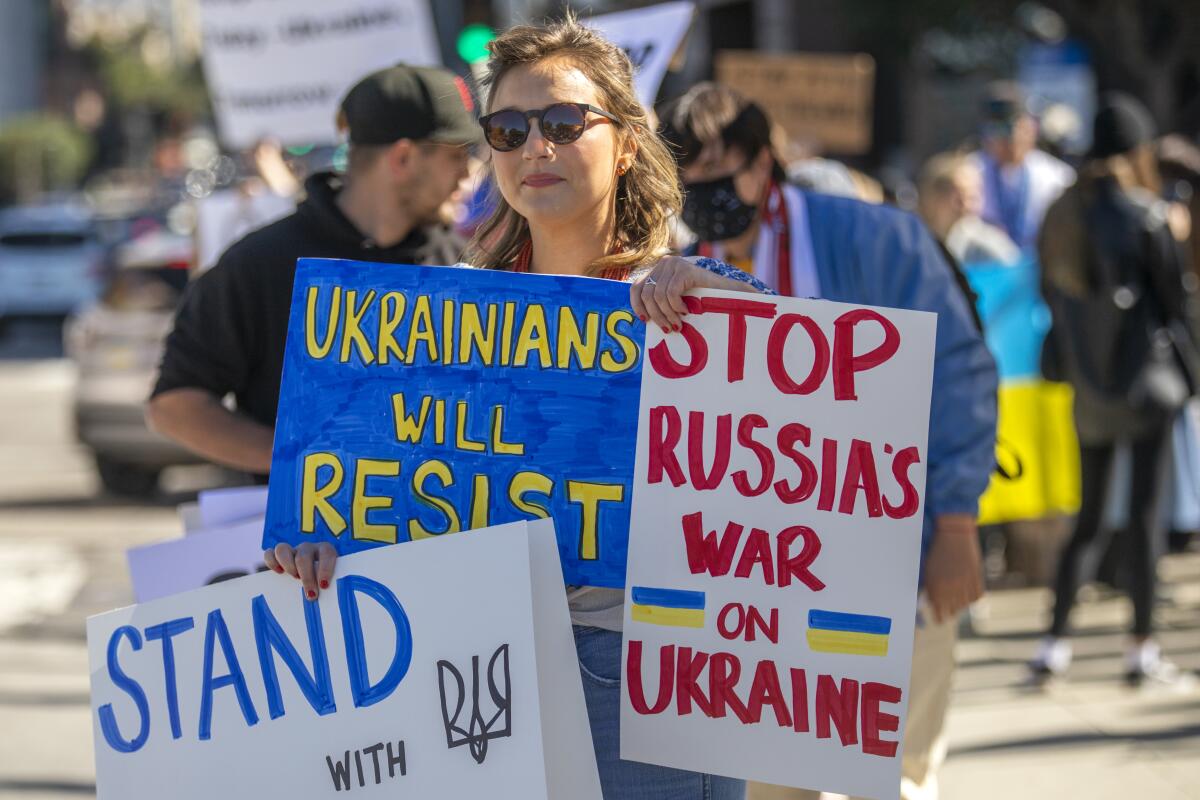
By Thursday afternoon, more than 100 protesters had gathered in front of the federal building in Westwood, decrying Russia’s attack. Some waved Ukrainian flags while others held signs that read “Stop Putin” and “Ukrainians will resist.” Others shouted, “Putin go home!”
Similar demonstrations and vigils were scheduled for later in the afternoon in the Bay Area, Sacramento and elsewhere in Los Angeles, according to social media reports.
Mykhailo Lavrys, an attorney who moved to Los Angeles from Ukraine in 2011, said that he tries to video-chat with his family in Ukraine every day to make sure they are OK.
“People there are distressed, don’t know what may happen next day,” the 33-year-old said. “My mother, my other family, I try to tell them that even though it’s scary, the Ukrainian army is strong and will defend our land. But no one really wants war. That means a lot of innocent people will die.”
On Wednesday, hours before the attacks were launched, Lavrys said that the Biden administration was not doing enough to put pressure on Russia. He pointed to the 1994 Budapest Memorandum on Security Assurances, which entitles Ukraine to seek help from countries including the United States when its security is threatened, in arguing that the U.S. needs to do more to protect Ukraine. The agreement helped to persuade Ukraine to give up its nuclear arsenal.
“Putin and other oligarchs can suffer losses, but sanctions won’t be enough,” he said. “The U.S. and the rest of the democratic world should implement all things available right now. Russia sees the waiting game as a weakness in the Western world.”
- Share via
Watch L.A. Times Today at 7 p.m. on Spectrum News 1 on Channel 1 or live stream on the Spectrum News App. Palos Verdes Peninsula and Orange County viewers can watch on Cox Systems on channel 99.
More to Read
Sign up for Essential California
The most important California stories and recommendations in your inbox every morning.
You may occasionally receive promotional content from the Los Angeles Times.
